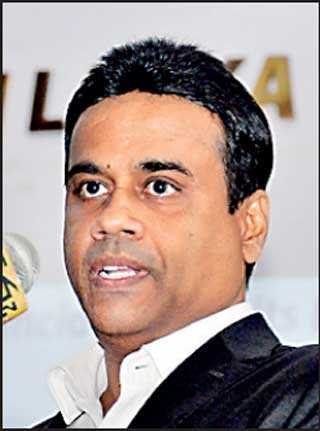Thursday Feb 19, 2026
Thursday Feb 19, 2026
Thursday, 30 May 2019 00:10 - - {{hitsCtrl.values.hits}}
By Charumini de Silva
The revising of travel advisories by key tourist countries has bolstered expectations of Sri Lanka recovering faster than expected from the Easter Sunday attacks, an industry expert said yesterday, but acknowledged that Government-led recovery plans were still essential.
 |
Kishu Gomes – Pic by Lasantha Kumara |
In a forum titled ‘4/21 Incident and its impact on HR in Tourism’ organised by the Sri Lanka Institute of Tourism and Hotel Management (SLITHM), the industry stakeholders reiterated it was the prime responsibility of all stakeholders to develop a constructive strategy to support tourism industry employees.
“What we are experiencing today is a temporary situation. To date six major countries have already relaxed their adverse travel advisories on Sri Lanka and we want that trend to continue. We are confident that within the next few days more countries will withdraw or soften their adverse travel advisories,” Sri Lanka Tourism Promotion Bureau (SLTPB) Chairman Kishu Gomes said, delivering the keynote address.
About 30 countries imposed travel advisories on Sri Lanka immediately after the Easter Sunday terror attacks. The tourism industry is essential for Sri Lanka’s growth, Gomes said, as the top two foreign exchange earners, namely apparel and foreign remittances, were highly-competitive industries.
“Tourism is the most critical and strategic industry that we all need to keep growing. We are in a crisis and the only way to get out of it is through the tourism industry. Unless we grow tourism revenue from $ 4.3 billion to $ 10 billion over the next five years, Sri Lanka will have major challenges in moving from the current $ 3,900 per capita income to the desired $ 7,000 per capital level,” he added.
Gomes pointed out Sri Lanka’s per capita income increase during the past three years had been only $ 50 on a year-on-year basis.
John Keells Holdings Vice President Dileep Mudadeniya said Sri Lanka would take one year to recover from the terror attacks, provided no additional incidents took place. However, he stressed that the industry needed to be mindful of the impact of elections scheduled for 2019 and 2020.
Citing some of the countries that had experienced similar incidents, he said that a destination takes about 13 months to recover from a terrorist attack. Mudadeniya also said Sri Lanka was somewhat fortunate the Easter attacks happened during the off-peak season, which gives Sri Lanka breathing space to recover and be ready for the peak season starting from September.
Working to bolster confidence about Sri Lanka being a safe destination and formulating a recovery marketing plan were outlined as critical factors to be implemented in the short-term to counter challenges, including negative media exposure, adverse travel advisories, stereotyping by consumers and competition from alternative destinations.
Establishing better security measures, loosening fiscal and monetary policy, investing in destination marketing activities and providing industry support were cited as some of the measures taken by other countries that have previously experienced terror attacks. These policies have been adopted by a range of countries including the US, Bali, France, Kenya, Tunisia and Egypt.
However, the industry will have to focus on increased reliance on outsourcing, freezing recruitments, reducing the number of workdays per week, freezing pay rates, and cutting down on existing staff, which will be necessary in the short- and medium-term for the industry to recover.
Shangri-La Hotel Colombo Vice President and General Manager Timothy Wright said their immediate concern post-Easter Sunday attacks was for the people who were injured and deceased.
“These attacks were not led by Muslims but terrorists. We were not at all concerned about the revenue loss, but about our staff and guests who were injured and lives lost at the hotel. I had a couple of conversations with the Shangri-La Group owners and their concerns were not on financial loss or property damages, but about the people,” he said.
The Kingsbury General Manger Christine Chevalaz pointed out that despite being highly-trained people, it was still daunting to come to terms with Easter Sunday’s traumatising event. “Immediately after the incident we ensured safety and assessed who needed priority care and ensured that there was no long-term impact on our staff. We conducted many counselling programs,” she added.
At a time where the occupancy rates are not so great, she said they had now engaged their employees in grooming skills and cross training activities which will help improve multitasking.
Chevalaz commended the messages of support from local communities, clients and the international community, noting that it had been an amazing and very motivational factor, particularly for the staff.
She also emphasised on the need to have a recovery marketing plan to change mindsets and attitudes of travellers. “Sri Lanka is a great destination, but need we need a strong marketing plan because travellers compare. All industry stakeholders have to come together and push the Government in marketing Sri Lanka in a stronger manner. Let’s hope everybody will come together and that our recovery process will be shorter than a year,” Chevalaz said.